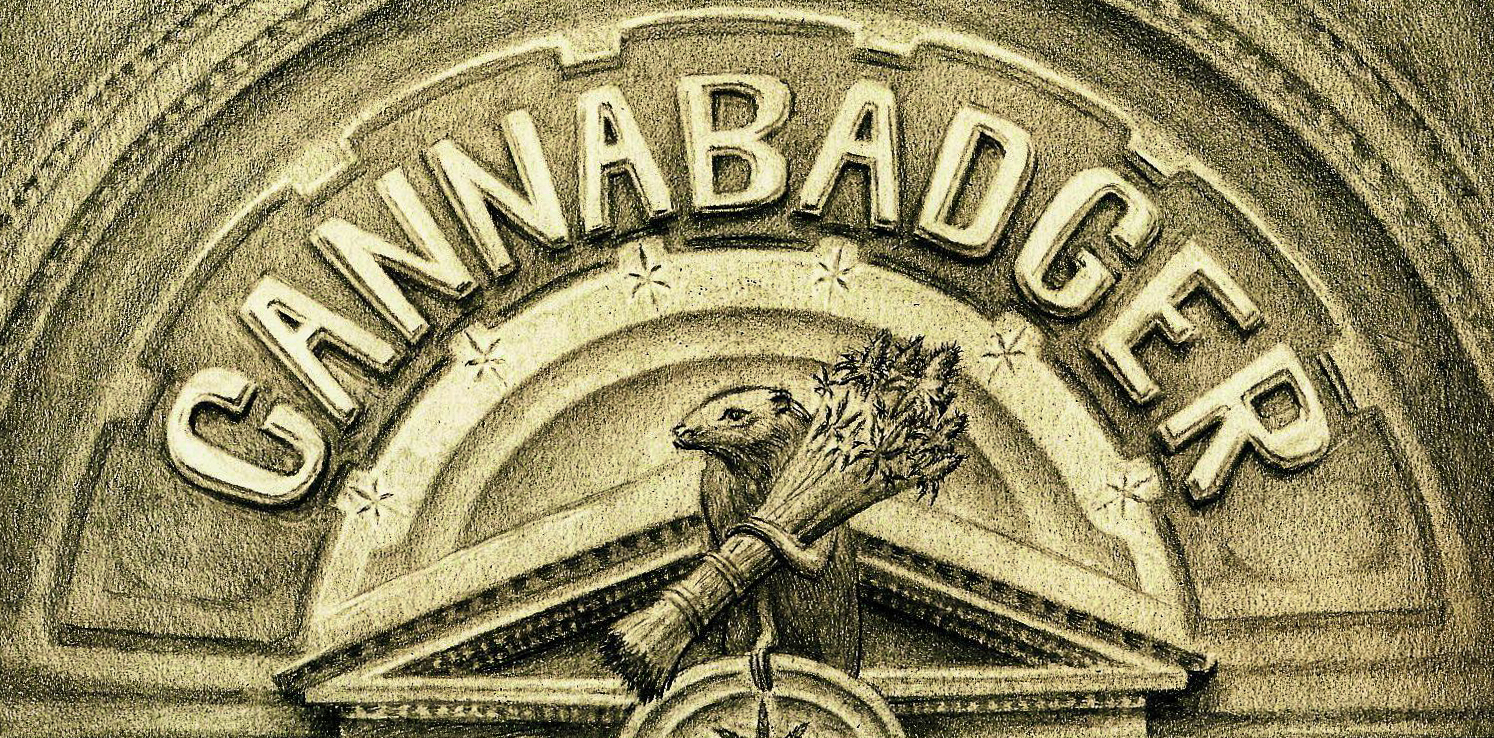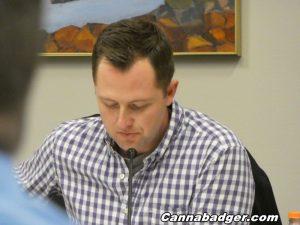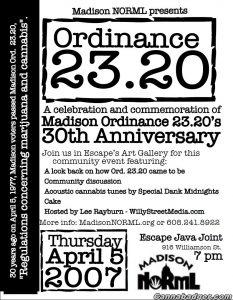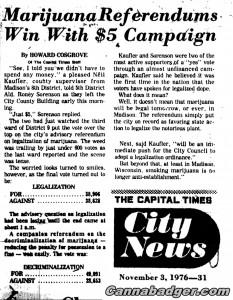Ever since I became aware of Madison Ordinance 23.20, “Regulations concerning marijuana and cannabis,” the binding referendum passed by Madison voters in April 1977, I’ve wanted to know more about its history and how it came to be.
Madison NORML flier from Ord. 23.20 30th birthday party in 2007. (Cannabadger.com)
In 2007, I put together a 23.20 30th birthday party as then-president of Madison NORML. To prepare for a power point presentation, I scoured old newspaper microfiche and Madison city council records to create a timeline.
This year, with the 40th anniversary approaching, I did more research and found many new articles to add to my timeline.
The following is an excerpt from the product of that research, and will be part of a book or e-book looking at the history of cannabis in Madison and Wisconsin I’ve been working on.
On April 5, 1977, Madison voters passed Question 6, “Regulations concerning marijuana and cannabis,” which became Madison’s landmark cannabis decriminalization law, Madison Ordinance 23.20, with over 60% of the vote.
FOR: 40,681 — 60.6%
AGAINST: 26, 432 — 39.4%
TOTAL: 67,113 — 100 %
This April 5 marks the 40th anniversary of the passage of Ordinance 23.20, through a binding referendum. Ord. 23.20 was placed on the ballot largely through the efforts of Ald. Roney Sorensen, Dist. 5, and Dane County Supervisor Neil Kaufler, Dist. 8. The two, along with supporters, collected over 7,000 signatures in 1976.
Neil Kaifler & Roney Sorensen from Wisconsin State Journal article photos.
On July 24, 1976, an item in the Metro Digest of the Wisconsin State Journal, “ACLU seeks pot decriminalization,” reported that the Capitol Area office of the American Civil Liberties Union (ACLU) was launching a petition drive to seek to decriminalize the possession of small amounts of pot in Madison.
ACLU spokesman LaMont Gregory noted 7,632 signatures were required, and if that number was reached, the City Council would be obligated to vote on the proposal. If the Council rejects, Gregory said, the question would then be put before Madison voters in the November election through a binding referendum.
The ACLU’s petition proposed that the possession of small amounts of cannabis “in a private place” not be considered a crime. Those who possess a small amount of marijuana “in a public place” would face a maximum fine of $5.
According to City Council records, on Sept. 21, 1976, the petitions to place Ord. 23.20 on city ballots as a binding referendum were submitted to the city. Madison City Clerk Eldon L. Hoel reported the petition for direct legislation was signed by 7666 electors, with 7602 being the requisite number to place it on the ballot.
Petition circulated by E. Lamont Gregory of the UW-Madison campus ACLU, and signed by 32 electors.
Copy of 23.20 petition Page 1. (Cannabadger.com)
Copy of 23.20 petition Page 2. (Cannabadger.com)
As Cannabadger reported in a Nov. 2016 post, “40 years ago Madison voted to legalize cannabis like alcohol or tobacco,” thousands of signatures were collected in 1976 to place three referendums on city ballots. Two advisory referendums on the Nov. 1976 ballot and the binding referendum Ord. 23.20 on the April 5, 1977 ballot.
Wisconsin State Journal Timeline Article March 1977.
On November 2, 1976, Madison voters voted on two advisory referendums, one on support for legalization and the other for support on decriminalization and both passed. A Nov. 3, 1976 Capital Times article reported that the two lead organizers of the two campaigns, Madison Ald. Roney Sorensen and Dane County Supervisor Neil Kaufler said they spent a total of only $5.00 on both campaigns. After the two wins Kaufler joked that, “at least in Madison, Wisconsin, smoking marijuana is no longer anti-establishment.”
Two days after the election, Nov, 4, 1976, in an article titled, “City marijuana vote seen as message to lawmakers,” the Wisconsin State Journal wrote; “Madison voters narrowly affirmed Tuesday by a 38,906 to 38,828 tally that marijuana be made a legal drug like alcohol, tobacco or coffee”.
Nov. 3, 1976 Capital Times article on cannabis advisory referendums.
Of a total 77,734 votes, 50.05% favored legalization and 49.95% opposed. The decriminalization vote was 63% in favor (49,091 votes) versus 37% against (28,853 votes) with the total votes cast 77,944.
The Ord. 23.20 campaign was not without controversy, with city officials repeatedly struggling over the language. The council initially voted in Oct. 1976 to place the entire question on the April 1977 ballot but later reconsidered after City Atty. Henry Gempeler said the provision legalizing cannabis possession in private places was “palpably illegal in that under no stretch of the imagination may the city by ordinance legalize that which the state has deemed to be a crime.”
In December 1976, Madison historian Stu Levitan, then writing for the Capital Times, reported Mayor Paul Soglin attended the NORML Conference in Washington, D.C., where he spoke about the referendum, stating there was a good possibility it would pass. But he also warned “very difficult and complicated legal problems” could soon follow.
NORML Founder and then-Director Keith Stroup agreed saying he was “not totally convinced that the initiative is the best idea.” He said alders should instead pass the ordinance themselves. Stroup also said Wisconsin was one of NORML’s target states for full decriminalization in 1978.
Levitan’s article also noted the presence of Hunter S. Thompson at the conference, who expressed skepticism about cannabis decriminalization, telling attendees, “The years of active combat has brought the marijuana law reform movement to the verge of some sort of victory, but it seems like a very hollow victory to me.”
Thompson said the problem was that decriminalization would not solve inequities in grass production and distribution, because “it’s like detente. It’s a policy word that stands for some neutral no-man’s land where things are neither legal nor illegal, where we agree to disagree, or disagree to agree, or agree to not agree to disappear.”
In a Feb. 9, 1977 article, “City lightens marijuana law,” Thomas W. Still of The State Journal reported, “Following examples already set by the neighboring Cities of Middleton and Monona, the Madison City Council Tuesday night voted 18-1 to adopt a law that basically removes criminal penalties for possession of marijuana.”
The new ordinance made simple possession punishable by a maximum $25 fine. Before the vote, Neil Kaufler told alders “When I was talking about this a year ago it was quite controversial. Now if s almost an establishment issue.”
Kaufler also pointed to the two Nov. 1976 referendum victories in calling for council support of the ordinance, “The voters of the City of Madison have forced your hand at long last. And if you don’t vote for this, you will be forced out of office.”
Ald Michael Christopher, Dist. 6, said with the passage of the new ordinance, the binding marijuana decriminalization referendum scheduled for the Apr. 5 ballot will probably be removed.
The article notes that a few minutes after the passage of the ordinance, “several persons lit up marijuana cigarets in a hallway outside the council chambers.”
In a March 30, 1977 editorial, The State Journal urged a no vote, stating, “The referendum proposal would allow only a city charge. Cities cannot abrogate state law. There is little doubt that, if enacted, it would be overturned as unconstitutional.”
Ultimately, and it’s hard to determine exactly how from council records and news articles, and despite the concerns about conflicts with state law, the ordinance appeared as written on city ballots, winning easily. Ord. 23.20 has never been challenged and it remains on the books today.
Coincidentally, the concept of cannabis in private places came up at a Monona city council meeting during debate over several ordinance
The March 20, 2017 Monona city council minutes describe what happened:
Alder Kirslaar, author of the amendment voted in 4-3. (Cannabadger.com)
“Alder (Andrew) Kitslaar explained his goal was to get the Ordinance close to the City of Madison’s , which allows for use in a “private place”. The original amendment changes the fine from the current $200 ($313 total forfeiture) to $1 for individuals aged 21 or over. His amendment includes exemptions for individuals over age 21 for possession in any location and for use inside or outside of their personal residence. Penalties remain the same for underage, use or possession in other locations, and all other violations. Possession was added to allow a person to go from their car to their house without violating the law. He is now more in agreement with Alder Brian Holmquist’s amendment. City Attorney Cole stated the use of the word “exempt” means repeal of the Ordinance but state law still applies. It exempts violations in City laws but not for state and federal laws.”
Madison Ord. 23.20 broke new ground 40 years ago and still is inspiring cannabis law reform today. Happy Birthday 23.20!



